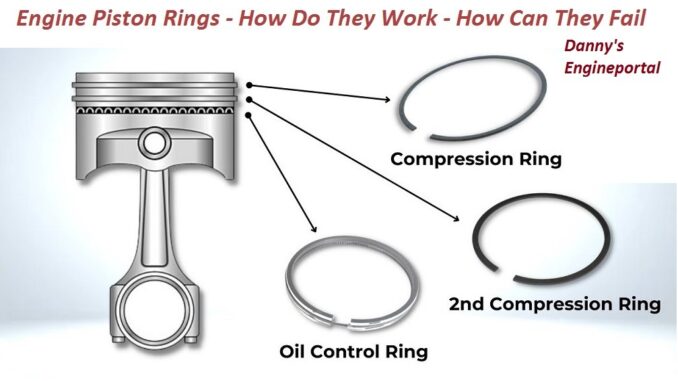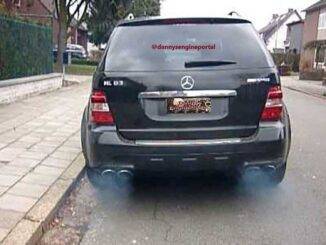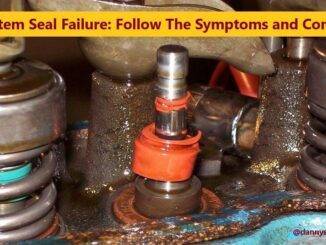
First, engine piston rings, have one of the most important jobs. Because, they seal the combustion chamber, while dissipating heat.
And, they need to ensure that no oil reaches the combustion chamber, while keeping the compression in the cylinder.
Most engine piston rings used today, include three different ring types: the compression ring, the wiper ring, and the oil ring. And, they must all work together, to function properly.
So, one of the most prominent materials, used in making engine piston rings, is cast iron.
This is because it contains graphite, which itself acts as a lubricant between the rings, and the cylinder. Furthermore, some engine piston rings even have alloys and coatings, to increase functionality for specific applications.
The life span of engine piston rings, entirely depends on:
- The piston ring type.
- The size of the engine.
- And, the operating conditions.
How Do The Three Engine Piston Rings Work:
The Top Grove Holds, The Compression Ring
So, it’s function is, to seal any kind of leakage inside the combustion chamber, during the combustion process. Firstly, the pressurized gases travel through the gap, between the cylinder wall and the piston. And, into the piston rings groove, on the piston.
Then, during the combustion process, the force of high-pressure gases, presses the piston ring, against the cylinder wall. Consequently, this pressure pushing the engine piston rings, is proportional to the combustion gas pressure.
The Second Grove Holds, The Wiper Ring (sometimes called the scraper ring)
They have a tapered face construction. And, are used to further seal the combustion chamber. Also, as the name suggests, they assist in wiping the cylinder wall clean, of any excess oil and impurities. So, if gases were able to pass by the compression ring, they would be blocked, by the wiper ring.
The Third Grove Holds, The Oil Rings
So, the main function of the oil ring is, to scrape any excess oil, off the cylinder walls. As a result, the majority of the wiped oil, is directed into the crankcase, back to the oil sump.
Consequently, these oil rings come, spring fitted at the back, to provide an additional push, for wiping the cylinder.
Rings Have Four Basic Jobs To Do:
Sealing Engine Compression
Engine piston rings maintain the compression, between the piston and the cylinder wall. Furthermore, piston rings seal the cylinder, so that combustion gas, does not leak between the piston and the cylinder. However, if combustion gas leaks, the engine cannot output sufficient power, increasing fuel consumption.
Lubricating Oil Film Control
Piston rings usually make, a necessary lubricating oil film, to preventing scuffing. But, enough so they move smoothly, with little friction, between metals. Finally, piston rings automatically adjust the amount of oil needed, for proper operation.
Proper Heat Transfer
So, piston rings transfer heat, from the piston crown to the cylinder. Because, if heat accumulates inside the piston, the engine may be damaged. For that reason, it is necessary to release the heat build-up.
Piston Support
So, piston rings prevent the piston from, knocking on the cylinder wall. Then, if the piston contacts the cylinder walls, piston scuffing is a possibility. So, piston rings support the piston during travel, to allow for smooth up and down motion.
How Can Engine Piston Rings Fail
The combustion chamber exerts, tremendous pressure on the piston rings. So, if the combustion pressure is higher than usual, it may affect the ring performance. As a result, causing engine oil consumption.
And, this can be due to detonation and pinging. As a result, of a leaky injector or when the fuel, is mixed with dirty air.
Contaminated fuel or the wrong grade of engine oil, will also affect the performance of the rings.
Engine oil quality, bad combustion process, wrong fuel timing and worn cylinders. Most often, are the normal cause of piston ring wear. Sticky rings due to carbon or sludge deposits, and breaking or cracking, can result due to wear.
Narrow Groove Rings
So, the narrower the ring, the more fragile they become. As a result, when piston rings are made narrower, the strength needs to increase. For this reason, a performance build, using narrow rings means, that you need the strongest material. Steel-based rings are 20-percent stronger, than ductile iron rings. Consequently, making them the ideal choice, for narrow rings. Furthermore, ductile iron rings are very strong and forgiving.
Horsepower is not the only benefit of a narrow steel ring. Because, the ring is so narrow, it reduces friction, and can conform to the cylinder wall better.
So, the engine is more efficient and seals better. This means less oil blow by, and less emissions. Steel rings last longer, but, they do take longer to break in.
Conclusion
So, engine piston rings must deal with an assortment of issues. Bad gas (detonation and pinging), dirty air and fuel, and contaminated oil, all reduce the life of piston rings.
Above all, maintaining the filters and regular oil changes, make a big difference, in how long the rings last. Finally, once the rings have worn down, their ability to seal the combustion gases, will become apparent.
BY DANNY BENDER




